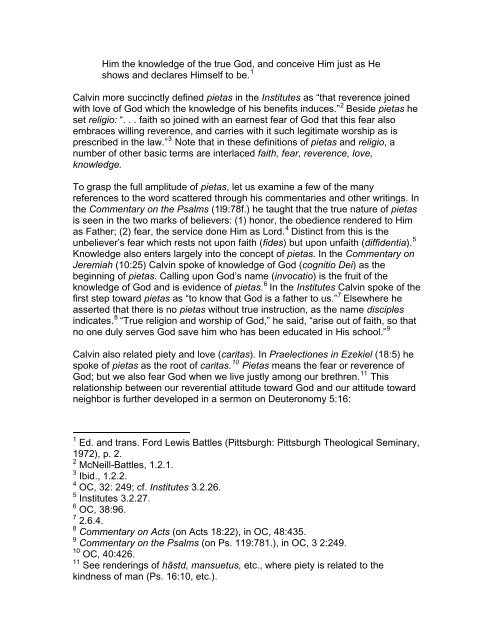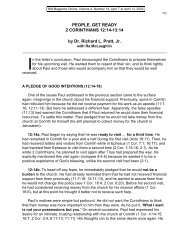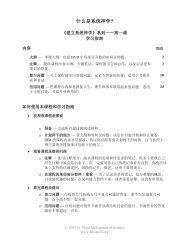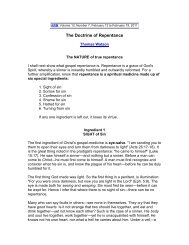The Piety of John Calvin - Third Millennium Ministries
The Piety of John Calvin - Third Millennium Ministries
The Piety of John Calvin - Third Millennium Ministries
You also want an ePaper? Increase the reach of your titles
YUMPU automatically turns print PDFs into web optimized ePapers that Google loves.
Him the knowledge <strong>of</strong> the true God, and conceive Him just as He<br />
shows and declares Himself to be. 1<br />
<strong>Calvin</strong> more succinctly defined pietas in the Institutes as “that reverence joined<br />
with love <strong>of</strong> God which the knowledge <strong>of</strong> his benefits induces.” 2 Beside pietas he<br />
set religio: “. . . faith so joined with an earnest fear <strong>of</strong> God that this fear also<br />
embraces willing reverence, and carries with it such legitimate worship as is<br />
prescribed in the law.” 3 Note that in these definitions <strong>of</strong> pietas and religio, a<br />
number <strong>of</strong> other basic terms are interlaced faith, fear, reverence, love,<br />
knowledge.<br />
To grasp the full amplitude <strong>of</strong> pietas, let us examine a few <strong>of</strong> the many<br />
references to the word scattered through his commentaries and other writings. In<br />
the Commentary on the Psalms (1l9:78f.) he taught that the true nature <strong>of</strong> pietas<br />
is seen in the two marks <strong>of</strong> believers: (1) honor, the obedience rendered to Him<br />
as Father; (2) fear, the service done Him as Lord. 4 Distinct from this is the<br />
unbeliever’s fear which rests not upon faith (fides) but upon unfaith (diffidentia). 5<br />
Knowledge also enters largely into the concept <strong>of</strong> pietas. In the Commentary on<br />
Jeremiah (10:25) <strong>Calvin</strong> spoke <strong>of</strong> knowledge <strong>of</strong> God (cognitio Dei) as the<br />
beginning <strong>of</strong> pietas. Calling upon God’s name (invocatio) is the fruit <strong>of</strong> the<br />
knowledge <strong>of</strong> God and is evidence <strong>of</strong> pietas. 6 In the Institutes <strong>Calvin</strong> spoke <strong>of</strong> the<br />
first step toward pietas as “to know that God is a father to us.” 7 Elsewhere he<br />
asserted that there is no pietas without true instruction, as the name disciples<br />
indicates. 8 “True religion and worship <strong>of</strong> God,” he said, “arise out <strong>of</strong> faith, so that<br />
no one duly serves God save him who has been educated in His school.” 9<br />
<strong>Calvin</strong> also related piety and love (caritas). In Praelectiones in Ezekiel (18:5) he<br />
spoke <strong>of</strong> pietas as the root <strong>of</strong> caritas. 10 Pietas means the fear or reverence <strong>of</strong><br />
God; but we also fear God when we live justly among our brethren. 11 This<br />
relationship between our reverential attitude toward God and our attitude toward<br />
neighbor is further developed in a sermon on Deuteronomy 5:16:<br />
1<br />
Ed. and trans. Ford Lewis Battles (Pittsburgh: Pittsburgh <strong>The</strong>ological Seminary,<br />
1972), p. 2.<br />
2<br />
McNeill-Battles, 1.2.1.<br />
3<br />
Ibid., 1.2.2.<br />
4<br />
OC, 32: 249; cf. Institutes 3.2.26.<br />
5<br />
Institutes 3.2.27.<br />
6<br />
OC, 38:96.<br />
7<br />
2.6.4.<br />
8<br />
Commentary on Acts (on Acts 18:22), in OC, 48:435.<br />
9<br />
Commentary on the Psalms (on Ps. 119:781.), in OC, 3 2:249.<br />
10<br />
OC, 40:426.<br />
11<br />
See renderings <strong>of</strong> hãstd, mansuetus, etc., where piety is related to the<br />
kindness <strong>of</strong> man (Ps. 16:10, etc.).







